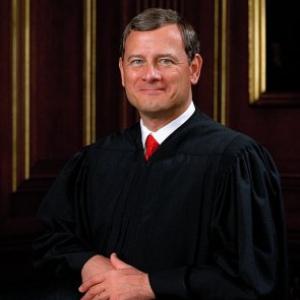Lauren Markoe covered government and features as a daily newspaper reporter for 15 years before joining the Religion News Service staff as a national correspondent in 2011.
Posts By This Author
Americans Split on Businesses Turning Away Gay Weddings
A host of governors, CEOs, and church leaders call Indiana’s new religious freedom law a backdoor opening to anti-gay discrimination, but Americans appear more divided on whether a wedding-related business should have the right to turn away a gay customer.
The law, which critics say would allow owners of small businesses to invoke their faith to refuse service to LGBT customers, applies most apparently to wedding vendors — bakers, photographers, and florists, for example — who cite their faith in opposing same-sex marriage.
Where is the American public on this debate? It depends on how the question is asked.
A February Associated Press poll found that 57 percent of Americans believe a wedding-related business should have the right to refuse service to a gay couple on religious grounds, as opposed to nearly 4 in 10 Americans (39 percent) who said that religious exemption — which Indiana’s new law explicitly allows — is wrong.
Anti-Semitism in U.S. Spikes After a Decade of Decline
Anti-Semitic incidents in the U.S. spiked 21 percent last year, according to the Anti-Defamation League, unsettling many American Jews who had thought that hatred of Jews and Judaism was on the decline, at least here at home.
The ADL has released a spring report for the past 10 years that showed fewer incidents targeting American Jews. That downward trend contrasted sharply to the rising tide of anti-Semitism in Europe — recently witnessed in the January killings of four Jews at a kosher supermarket in Paris.
“The United States still continues to be unique in history” as a safe place for Jews, said Abraham Foxman, the ADL’s national director.
But this new ADL report casts a shadow on the idea that the U.S., which is home to more than 40 percent of the world’s Jews, stands in stark contrast to European anti-Semitism and far higher levels of antipathy against Jews in the Middle East, as reflected in studies of anti-Semitic attitudes worldwide.
“It’s still different here than anywhere else, but don’t take anything for granted, and be concerned,” Foxman said.
Disciples of Christ Look to Pull Convention From Indiana Over Religious Freedom Bill
Though the Christian Church (Disciples of Christ) has made Indianapolis its headquarters for nearly a century, the denomination is considering pulling its next biennial convention out of Indiana over a new state law that allows businesses to turn away gay customers.
Gov. Mike Pence signed the Religious Freedom Restoration Act on March 26, the day after receiving a letter from church leaders pleading with him to veto it and threatening to move their 2017 General Assembly outside the state.
The bill protects business owners who invoke their religious beliefs to deny service to LGBT customers. A photographer, for example, may refuse to take pictures of a lesbian wedding on the grounds that his faith rejects gay marriage.
“Purportedly a matter of religious freedom, we find RFRA contrary to the values of our faith — as well as to our national and Hoosier values,” stated the letter, which was signed by Sharon E. Watkins, the church’s general minister and president, as well as the leaders of its overseas and domestic missions.
“As a Christian church, we are particularly sensitive to the values of the One we follow — one who sat at table with people from all walks of life, and loved them all.”
The General Assembly will bring more than 6,000 church members to whatever U.S. city the church decides upon and is expected to generate about $5 million in tourism dollars. After Pence signed the law, ministry leaders said they are weighing the costs of moving not only the General Assembly, but smaller meetings — such as the more frequent gatherings of the 125-member board of directors — which most often meets in Indianapolis.
Associate General Minister and Vice President Todd Adams said the church’s board will decide whether to yank the General Assembly from Indianapolis at its next meeting, which begins on April 10.
Other businesses and conventions, including Gen Con, the world’s largest gaming convention, which brings an estimated $50 million to the state each year, have also threatened to find another place to hold their events.
The Passover Seder, Designed by and for Women
On the first night of Passover, Jews ask aloud, “Why is this night different from all other nights?”
For a group of 150-plus women gathered March 22 at Congregation Beth El north of Washington, D.C., that traditional question was followed by an alternative: “Why is this seder different from other seders?”
Answer: “At other seders, men traditionally lead the service. At this seder, women are the leaders.”
Women’s seders are not new. The women who gathered at Beth El on Sunday, 12 days before the holiday begins on April 3, have been at it for 19 years. These seders began in or near cities with substantial Jewish populations about a generation ago, when fewer women played leading roles in synagogues and other institutions of Jewish life.
Today, women in the Conservative, Reform, and Reconstructionist movements of Judaism in the U.S., which account for about 90 percent of synagogue-affiliated Jews, lead congregations as rabbis, cantors, and synagogue presidents.
Still, women’s seders proliferate, and each year, their guest lists grow.
Justice Ginsburg Writes a Feminist Opinion for Passover
Rabbi Ruth Bader Ginsburg?
Not quite, but when a Jewish nonprofit asked the Supreme Court justice to write a biblical commentary for Passover, she agreed, and added a feminist twist: It would raise up the often overlooked women of the Exodus story.
Ginsburg, one of three Jews and three women on the high court, is known as a champion of women’s rights — but not for being particularly religious.
But Rabbi Lauren Holtzblatt, whom Ginsburg asked to help out with the commentary, said Ginsburg had a clear vision for the piece and knew exactly which biblical women she wanted to highlight from the iconic liberation story of the Book of Exodus.
“She has a Jewish soul, there is no question,” Holtzblatt, a rabbi at Adas Israel, a Conservative synagogue in Washington, D.C., said of Ginsburg.
“It’s in her. It’s deeply in her.”
'Little White Lie' — Untangling Family Secrets, Finding New Identity
The Schwartzs seemed like any other Jewish family in Woodstock, N.Y. except for one thing: Mom and Dad were obviously white, and their daughter Lacey was obviously not.
That racial disconnect would be easier to fathom if Peggy and Robert Schwartz hadn't had everyone believing their dark-skinned daughter was the biological child of both parents.
It would take Little White Lie, the film an adult Lacey made about family secrets and religious identity, to unpack this mystery.
“I grew up in a world of synagogue, Hebrew school, bar mitzvahs,” Schwartz narrates over a home movie montage of Jewish holiday celebrations and her own bat mitzvah.
“So it never occurred to me that I was passing,” she continues.
“I wasn’t pretending to be something I wasn’t. I actually grew up believing I was white.”
Little White Lie, which has enjoyed success on the film festival circuit and will reach a larger audience when PBS’s Independent Lens airs it on March 23, revolves around a flabbergasting central question: How could this family pretend that she owed her complexion to the genes of dad’s darkest Italian ancestor?
Schwartz said she wants the film to model how people can face up to family secrets and move on with their lives. In her case, the secret was her mother’s affair with a black man.
Anti-Semitism a Big Problem at U.S. Colleges, Report Says
A student group in South Africa this month called on all Jews to leave the Durban University of Technology, an act of anti-Semitism that Americans could not imagine on their own college campuses.
But a comprehensive survey of anti-Semitism at American colleges released this week shows that significant hostility is directed at Jews on U.S. campuses, too.
The National Demographic Survey of American Jewish College Students, produced by a Trinity College team well-known for its research on religious groups, found that 54 percent of Jewish students experienced anti-Semitism on campus in the first six months of the 2013-2014 academic year.
Professors Barry A. Kosmin and Ariela Keysar asked 1,157 students in an online questionnaire about the types, context and location of anti-Semitism they had encountered, and found that anti-Jewish bias is a problem for Jews of all levels of religious observance.
“And this is a national problem; it’s not just happening in pockets of areas,” Keysar said. “Hopefully people will read this survey as a wake-up call. Clearly, the students want us to do something.”
The survey, she also noted, was given to students months before last summer’s war between Israel and Gaza, which ignited much anti-Israel sentiment on college campuses, sentiment that at times crossed the line into anti-Semitism.
Supreme Court Wrestles with Accommodating Religious Faith on the Job
Samantha Elauf was a teenager who loved clothes and applied to work in an Abercrombie & Fitch Kids store in her native Tulsa, Okla., in 2008. But Elauf, a Muslim, also happens to wear a headscarf. So she didn’t get the job.
No one — not even Abercrombie & Fitch — disputes that her hijab cost her the job offer. And the law, Title VII of the Civil Rights Act of 1964, states that an employer can’t deny employment based on an worker’s religious practice, unless accommodating it would prove terribly burdensome.
At the time, Abercrombie had a “no hats” policy for its sales associates. When the U.S. Supreme Court heard Elauf’s case on Feb. 25, Justice Ruth Bader Ginsburg summed up the religious exemption required of the company: “Title VII doesn’t require accommodating baseball caps, but it does require accommodating religious practice.”
So why did this case make it all the way to the Supreme Court?
Elauf, though she won in a federal district court in 2011, lost in a federal appeals court in 2013. At the 10th U.S. Circuit Court of Appeals in Denver, the company’s argument — that it shouldn’t have had to give a religious accommodation because Elauf never asked for one — found traction.
Do we really want companies delving into an applicant’s religious practice in order to determine whether the person might want an accommodation, Abercrombie lawyer Shay Dvoretzky asked the justices on Wednesday.
“This will inevitably lead employers to stereotype,” he said.
Drones Make War Too Easy, Too Remote, Faith Leaders Say
For the Obama administration and the Bush administration before it, drone strikes kill terrorists before terrorists can kill innocents, and the strikes keep American soldiers out of harm’s way.
But for a group of faith leaders, drones are a crude tool of death that make killing as easy as shooting a video game villain, and they put innocents in harm’s way.
These religious critics — 150 ministers, priests, imams, rabbis, and other faith leaders who gathered at the Interfaith Conference on Drone Warfare at Princeton Theological Seminary in late January — have spent the weeks since drafting a statement that calls on the U.S. to halt targeted lethal drone strikes.
“There are enough problems with the current drone policy and the use of drones that we need a break,” said the Rev. Richard Killmer, director of the conference. “Drones have become a weapon of first resort and not last resort. It has made it a lot easier to go to war.”
Vaccines and Abortion? The Links Are Cloudy and Complicated
With measles outbreaks in 14 states and health authorities imploring parents to weigh the minimal risks of vaccines against the ravages of preventable disease, some Christians are raising an objection of a completely different sort: the abortion connection.
Abortion?
The Internet rumors that claim vaccinations mean having tiny pieces of aborted fetuses injected into your body are flat-out wrong, yet there is a grain of truth in the assertion that vaccinations and abortions are linked.
Many of the most common vaccines, for rubella and chicken pox for example, are grown in and then removed from cells descended from the cells of aborted fetuses. Pregnant women aborted them about 40 years ago by choice, and not with the intent of aiding vaccine production.
Yet for some religious believers, those facts do not lift what they see as a moral prohibition against vaccination.
Mission Trips Aren’t Just For Christians Anymore
Christian missionary work spans the globe. But Jewish mission trips?
Your average American synagogue is not planning a congregational visit to a poor corner of the world. But a few are starting to, and some rabbis are lobbying for more to follow.
“At a time when synagogues are losing market share and ‘Next Gen’ Jews are deeply ambivalent about how much they are prepared to identify as Jews, I can testify that this kind of service mission is a game changer,” said Rabbi Sid Schwarz, founding rabbi of Adat Shalom, a Reconstructionist synagogue in suburban Bethesda, Md.
Unlike many Christian groups, Jews don’t believe in proselytizing: It’s just not in their religious DNA. But alumni attest that synagogue-sponsored mission trips provide a hands-on way for Jews to fulfill the obligation of “tikkun olam,” Hebrew for “heal the world,” as they strengthen Jewish identities.
Schwarz and 20 congregants returned from a 10-day trip to Haiti in December — the congregation’s third trip in four years to the outskirts of Port-au-Prince. There, they partnered with a pastor and used their bodies and their bank accounts to build houses and provide school tuition for Haitian families, many who had been living under tarps since the devastating 2010 earthquake.
Schwarz can point to less than a handful of synagogues that have done similar mission work. One is Temple Beth El in Hollywood, Fla., which has made more than 10 mission trips to Haiti since 2007 and leaves again for the island on Jan. 19.
“The Christians have a tradition of missionary work, and part of it is to Christianize the world. We Jews have no interest in Judaisizing the world,” said Beth El’s Rabbi Allan Tuffs. Nevertheless, “we should be out there.”
Supreme Court Weighs a Church’s Right to Advertise Services
The Supreme Court on Jan. 12 considered a tiny church’s curbside sign in a case that could raise the bar on government regulation of speech, and make it easier for houses of worship to advertise their services.
The Alliance Defending Freedom, the nonprofit advocacy group that represents Pastor Clyde Reed and his Good News Community Church, bills the case, Reed v. Town of Gilbert, as a religious rights case. But their attorney mostly argued it on free speech grounds.
“The town code discriminates on its face by treating certain signs differently based solely on what they said,” attorney David A. Cortman told the justices. “The treatment we’re seeking is merely equal treatment under the First Amendment.”
The town of Gilbert, Ariz., outside Phoenix, allows political signs to be much larger and permits them to stay up much longer, Cortman said.
The Top 10 Worst Attacks on Jews and Judaism in 2014
Hoping to draw more attention to the global problem of attacks against Jews and Judaism, the Simon Wiesenthal Center on December 29 released its list of the top 10 worst anti-Semitic and anti-Israel incidents of 2014.
The list can “bring focus to the fact that anti-Semitism has been increasingly manifest in the mainstream of society,” said Rabbi Abraham Cooper, associate dean of the center, which is named for the famed Holocaust survivor and Nazi hunter.
“Anti-Semitism is not just a Jewish problem, and it certainly is not going to get solved without awakening the non-Jewish world to deal with it.”
Founded in 1977 to combat anti-Semitism and bigotry in general, the Los Angeles-based center started drawing up the annual list in 2010 to highlight prejudice against Jews, but also criticism of Israel that seeks to delegitimize or demonize the Jewish state.
Below are the three worst incidents on this year’s list.
Rabbi David Saperstein Confirmed as U.S. Ambassador for Religious Freedom
The Senate has confirmed Rabbi David Saperstein as the State Department’s ambassador-at-large for international religious freedom, making him the first non-Christian to hold the job.
Saperstein, who led the Reform Jewish movement’s Washington office for 40 years, focusing on social justice and religious freedom issues, was nominated by President Obama in July and confirmed by a 62-35 vote on Dec. 12.
Saperstein takes a liberal bent on domestic issues, and all but one of the votes against him came from a Republican.
“Religious freedom faces daunting and alarming challenges worldwide,” Saperstein said at his confirmation hearing in September. “If confirmed, I will do everything within my abilities and influence to engage every sector of the State Department and the rest of the U.S. government to integrate religious freedom into our nation’s statecraft and foreign policies.”
Saperstein, named the most influential rabbi in America by Newsweek magazine in 2009, will head the State Department’s Office of International Religious Freedom, where he will be tasked with monitoring religious freedom abuses around the world.
Why Jews Skipped Hanukkah and Wrote the Most Beloved Christmas Songs
Christians don’t seem to mind that so many beloved Christmas songs were written by Jews — and Jews tend to reel off the list with pride.
"White Christmas." "Let It Snow." "Santa Baby." "I’ll Be Home for Christmas." "Chestnuts Roasting on an Open Fire." "Silver Bells." "Rudolph the Red-Nosed Reindeer."
Those not mentioned here could fill an album.
But why didn’t the Jews write any similarly iconic songs for their holiday that falls around Christmastime — Hanukkah, the Jewish Festival of Lights?
“I Have a Little Dreidl"? Great song … if you’re 4.
There are reasons that Jews are good at Christmas songs and why so many of these songs became so popular. And there are reasons why Jews didn’t write similarly catchy tunes for Hanukkah — or any other Jewish holiday.
But first, a little music history.
Conservative Christians Packed an Electoral Punch, but Can They Do It Again in 2016?
Conservative Christians are taking credit for the Republican sweep of the U.S. Senate and GOP victories farther down the ticket in Nov. 4's midterm elections, and they predict they will prevail again in 2016.
“This is not only the largest single constituency in the electorate, but it is larger than the African-American vote, the Hispanic vote, the union vote, and the gay vote combined,” Ralph Reed, one of the most recognized figures in conservative Christian politics, said Nov. 5 in a celebratory post-election press conference.
Reed, who chairs the Faith & Freedom Coalition, which mobilizes conservative Christian voters across the nation, said politicians in both parties ignore this constituency “at their own peril.”
Reed pointed to a poll commissioned by his group that shows that conservative Christians — Protestants and Catholics — made up 32 percent of the Republican electorate, and that they overwhelmingly voted (86 percent) for Republicans Nov. 4. These voters contributed 52 percent of the total votes received by Republicans, according to the Public Opinion Strategies survey, which had a margin of error of plus or minus 3.5 percent.
But some experts pointed out that little has changed in the religious electoral landscape.
Houston Withdraws Pastors’ Subpoenas
The mayor of Houston on Wednesday withdrew the subpoenas of sermons from five pastors who opposed an ordinance banning discrimination against LGBT people.
Filed two weeks ago, the subpoenas outraged many conservative Christians as an affront to religious freedom.
Houston Mayor Annise Parker said Oct. 29 that as important as it is to protect the Houston Equal Rights Ordinance (HERO), the subpoenas became a distraction. They were aimed at pastors active in the movement to overturn HERO through a citywide vote.
Parker, Houston’s first openly gay mayor, said she made the decision after meeting with Houston pastors and then with national Christian leaders, including National Clergy Council President Rob Schenck.
“They came without political agendas, without hate in their hearts and without any desire to debate the merits of HERO,” Parker said. “They simply wanted to express their passionate and very sincere concerns about the subpoenas.”
Erik Stanley, senior legal counsel for the Alliance Defending Freedom, called the subpoenas a “gross abuse of power.”
Ebola Prompts Hands-Off Mass in Fort Worth, Texas
The Blood of Christ will not be offered during Mass. The Host will be placed in the hands, not on the tongue. And the faithful should not hold hands while reciting the “Our Father.”
These are but a few of the guidelines the Diocese of Fort Worth — not far from the Dallas hospital where three Ebola cases have been diagnosed — has sent to its parishes to calm fears about the deadly disease and to prevent the spread of flu.
While the diocese is perhaps the first in the U.S. to send around such a memo thanks in part to Ebola, such restrictions are common during flu season in Catholic and other churches that offer Communion.
“It’s the same guidelines we have used in past years,” said Pat Svacina, communications director for the Diocese of Fort Worth. “This is just a normal thing. There is no panic whatsoever.”
New Report Links Decreased Church Giving to Pastoral Education
Christian researchers tracking decades of decline in charitable giving say the trend will not be reversed until pastors challenge congregants to embrace Jesus’ teachings on the poor.
But that, says Sylvia Ronsvalle, one of the authors of the annual “Empty Tomb” reports on Christian giving, will take a different kind of pastor than the counselors and comforters that seminaries and divinity schools have trained for ministry.
Seminaries instead need to school future clergy on the affluence of American congregations, and remind church members of “God’s agenda to love a hurting world,” the report said.
“The State of Church Giving through 2012: What are Christian Seminaries and Intellectuals Thinking — or Are They?” was issued by Empty Tomb, an Illinois-based nonprofit that tracks the percentage of church members’ income that they give to their congregation.
“Pastors are not being prepared to effectively pastor their people within an age of affluence,” said Ronsvalle, who wrote the report with her husband, John L. Ronsvalle.
Justice Roberts Asks If The Case of The Muslim Prisoner’s Beard Is Too Easy
In some ways, the case of the Muslim prisoner who wants to grow a beard seems easy. When it comes to a prisoner’s religious rights, federal laws favors accommodation when possible.
So how could Gregory Holt — known as Abdul Maalik Muhammad after his conversion to Islam — possibly lose at the Supreme Court, where the justices heard his case on Oct. 7?
Holt wants to grow a mere half-inch beard — a length of whisker allowed in the vast majority of state prison systems, but not the one where he is incarcerated: Arkansas.
Even Chief Justice John Roberts wondered how such a seemingly straightforward case came before the high court, which usually occupies itself with the thorniest of legal questions.

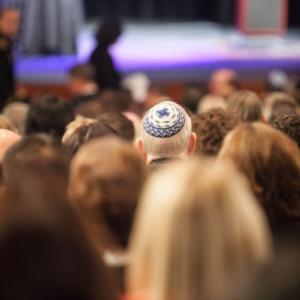
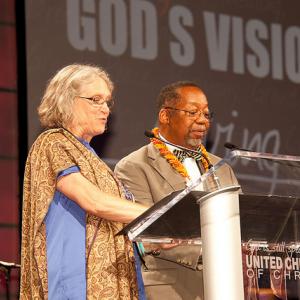
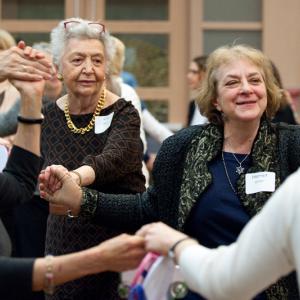

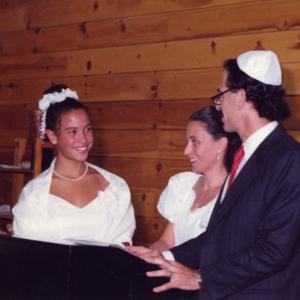





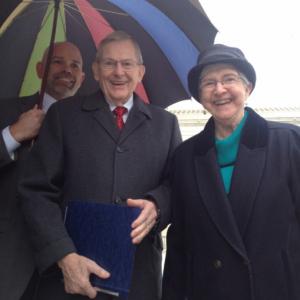

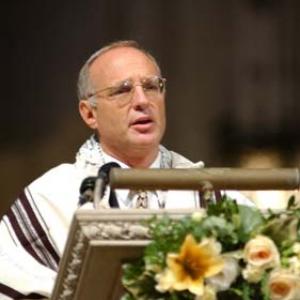


![Houston Mayor Annise Parker. Photo courtesy of Zblume (Own work) [Public domain], via Wikimedia Commons/RNS.](https://sojo.net/sites/default/files/styles/large_square/public/blog/Annise_Parker.jpg?itok=LSfBKdXO)


